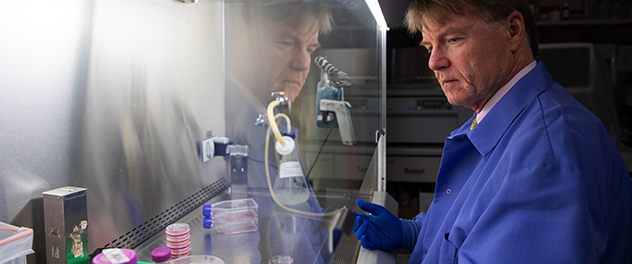 Personalizing cancer models
Personalizing cancer models
Led by Dr. Copland, our lab strives to create personalized cancer models and develop molecular-targeted therapies, focusing on renal cancer, thyroid cancer, liver cancer and breast cancer.
Overview
Led by John A. Copland III, Ph.D., the Cancer Biology and Translational Research Laboratory investigates renal cancer, thyroid cancer, liver cancer and breast cancer.
Our lab's overarching goals are to explore novel cancer genes, to better understand molecular mechanisms of carcinogenesis and tumor progression, and to develop effective molecular-targeted therapeutics.
Under Dr. Copland's leadership, our research team has made great strides in cancer research.
We've genomically profiled human carcinomas to identify aberrant signaling pathways, and we're further exploring these pathways in order to create novel, synergistic cancer therapies. Some of our achievements include:
- Describing a paradigm shift for the tumor suppressor FoxO3a, whereby our research team identified a new oncogenic role promoting tumor growth
- Discovering that stearoyl-CoA desaturase 1 (SCD1) plays an important role in carcinoma viability, with broad applicability across many aggressive cancers
- Determining that neuronal pentraxin 2 (NPTX2) is an oncogene in renal cell carcinoma
In addition, our lab is creating valid preclinical models that mimic patient tumors in order to better understand how tumors originate, survive and metastasize, which ultimately will help advance individualized medicine for patients with cancer.
Collaborative research
To help leverage the power of collaborative research to advance scientific discovery, our lab maintains affiliations with other Mayo Clinic research areas, including:
About Dr. Copland
In addition to serving as principal investigator of the Cancer Biology and Translational Research Lab, Dr. Copland is a professor of cancer biology and an associate professor of biochemistry and molecular biology at Mayo Clinic College of Medicine and Science in Jacksonville, Florida.
Dr. Copland received his undergraduate degree in chemistry from Columbus College and his Ph.D. in physiology and endocrinology from the Medical College of Georgia. He completed postdoctoral training in cellular and molecular biology at The University of Texas Medical Branch. His ultimate goal as a researcher is to improve the quality of life and prognosis for patients by developing novel molecular-targeted therapies.